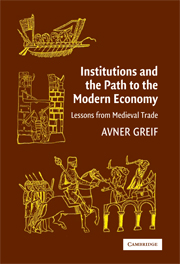Book contents
- Frontmatter
- Contents
- Abbreviations
- Preface
- I Preliminaries
- II Institutions as Systems in Equilibria
- III Institutional Dynamics as a Historical Process
- IV The Empirical Method of Comparative and Historical Institutional Analysis
- V Concluding Comments
- 12 Institutions, History, and Development
- Appendixes
- References
- Index
- POLITICAL ECONOMY OF INSTITUTIONS AND DECISIONS
12 - Institutions, History, and Development
Published online by Cambridge University Press: 05 September 2012
- Frontmatter
- Contents
- Abbreviations
- Preface
- I Preliminaries
- II Institutions as Systems in Equilibria
- III Institutional Dynamics as a Historical Process
- IV The Empirical Method of Comparative and Historical Institutional Analysis
- V Concluding Comments
- 12 Institutions, History, and Development
- Appendixes
- References
- Index
- POLITICAL ECONOMY OF INSTITUTIONS AND DECISIONS
Summary
This chapter reflects on four issues central to this book. Two are methodological: the nature of institutions and the analytical and empirical method with which to study them. Two are substantive: the insights from the comparative institutional analysis of institutions in the European and Muslim worlds and the policy implications of the perspective on institutions presented in this book.
Institutions are the engine of history because, as I argue in section 12.1, they constitute much of the structure that influences behavior, including behavior leading to new institutions. Their independent impact and their interrelations with social and cultural factors imply that we cannot study them as reflecting only environmental factors or the interests of various agents. Although institutions are not random and all institutions generating the same behavior respond to the same forces, their details and implications are not determined by these forces. Comparative and historical institutional analysis – the central aspects of which are reviewed in section 12.2 – fosters our ability to capture and study institutions from the required broader perspective.
Section 12.3 dwells on the insights from the comparative and historical analysis of institutions in the European and Muslim worlds during the late medieval commercial expansion. It emphasizes that many of the elements and features of modern, welfare-enhancing Western-style institutions were already present or in the process of emerging during the late medieval period: individualism, man-made formal law, corporatism, self-governance, and rules reflecting an institutionalized process in which those who were subject to them had a voice and influence.
- Type
- Chapter
- Information
- Institutions and the Path to the Modern EconomyLessons from Medieval Trade, pp. 379 - 406Publisher: Cambridge University PressPrint publication year: 2006



